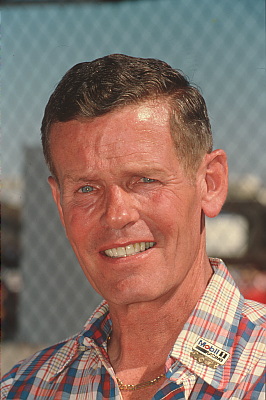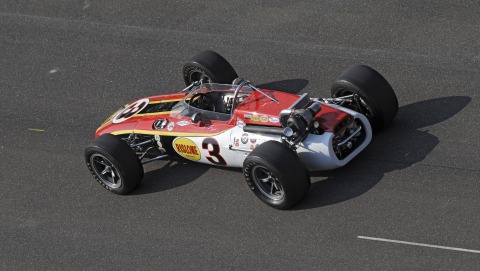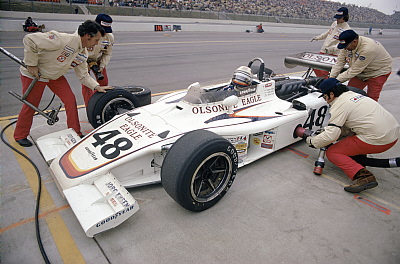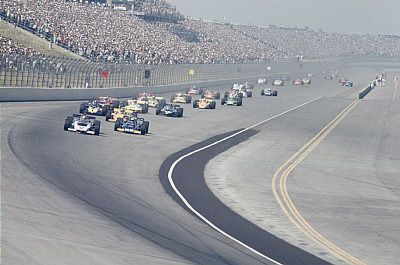The Way It Is/ Bobby Unser's undiluted opinion
by Gordon Kirby Bobby Unser never was one to shrink from expressing his opinion. A three-time Indy 500 winner, two-time USAC champion and winner of 34 Indy car races, Unser made his name by winning the Pike's Peak Hillclimb no fewer than thirteen times. But he was always as equally outspoken as he was fast and today, almost thirty years after retiring from driving, he remains as opinionated as ever. And for that I say, God bless him.
Bobby Unser never was one to shrink from expressing his opinion. A three-time Indy 500 winner, two-time USAC champion and winner of 34 Indy car races, Unser made his name by winning the Pike's Peak Hillclimb no fewer than thirteen times. But he was always as equally outspoken as he was fast and today, almost thirty years after retiring from driving, he remains as opinionated as ever. And for that I say, God bless him.
Like all of us Bobby is delighted with the news that Chevrolet and Lotus have committed to building both engines and 'aero kits' for IndyCar's new 2012 formula. But he warns that IndyCar must fix many of its rules and regulations if it is to take full advantage of 2012's fresh sheet of paper. First of all, Bobby is delighted to see Chevrolet coming back to IndyCar racing in 2012.
"That's the best thing that's happened to Indy car racing in a long time," Bobby says. "I was so happy when I heard it. It's so good. I can't believe how good it is. As we all know, there's been a lot of negativity about Indy car racing. It's obviously there, but this takes some of that negativity out. There's still a lot of things that are wrong and need fixing, but this is a big step in the right direction. It's going to help a bunch."
Unser saluted Roger Penske for making the latest Ilmor/Chevrolet deal happen.

© LAT USA
"I'm so proud of Roger," Bobby grins. "That damn Penske is always out there thinking and working and he's rousted out another big one. When Roger talks, things happen. Racing owes him a big thank you."
Unser strongly refutes any grumbling that Penske's team will get special engines.
"If anybody knew Roger like I do they would know that he's the last man in the world who would ever ask for or a demand an engine that was better than anyone else," Bobby declared. "But neither Roger nor Chevrolet can afford it because they're promising to deliver a product to everyone, just like they've done in the past, and both of them have their reputations to protect."
Unser is also delighted with the news that Lotus will build engines and 'aero kits' for 2012.
"It's fantastic that we will have three engine manufacturers in 2012," Bobby enthused. "I don't know much about the Lotus program but they're a great racing name and they should help make everything much healthier. It's great to see more competition and hopefully the end of all this spec car thing which has been so bad for racing."
Still, if Chevrolet and Lotus are to get the best from their investment Bobby believes a long list of issues need to be addressed. Unser despises spec cars and hopes the arrival of Chevrolet and Lotus will result in something other than today's spec car-like category.
"IndyCar did all those studies that have shown that people want innovation," Bobby said. "The fans want them to open up the rules. They don't want a spec car. The fans all agree. They hate spec cars and they all want to see something different. I'd rather have twenty good, different cars show up for a race than have twenty-eight spec cars."
Unser believes the arrival of Chevrolet and Lotus will enable IndyCar to make its 2012 formula more interesting and attractive. Bobby is not a fan of today's power-restricted formula. He hopes the 2012 horsepower/downforce package will make a big difference so that passing will be possible with more distance and speed between the cars.

© LAT USA
"NASCAR became the largest, most successful racing organization on earth, but when the spec car--the Car of Tomorrow--came in they dug their hole right then and there. They've all got the same car and it's no good. Gary Nelson sold that idea to Brian France and that's where everything started going to heck. They made it all the same. It's no different than Indy cars and they're losing their fans big-time. My message is that NASCAR did exactly the same screw-up."
For ninety or more years Indy cars were renowned for having huge horsepower and for rocketing past each other. They were spectacular to watch on their own let alone when they were racing and passing each other rather than today's cars inching up beside each other and straining to pass.
"It's absolutely true," Unser agrees. "The cars today run on the rev-limiter for sometimes a fourth of the straightaway at the Speedway and some of the other tracks.
"It's not brain surgery. Having fifteen cars running where you can throw a blanket over them isn't good racing. They're just wide-open all the time and they're going to touch wheels and have really bad accidents. The closer you get, the more draft you get, so you're going to rub tires and have accidents."
Bobby believes the minimum use of the throttle and steering wheel we witness today is boring and a key component in the fading interest in Indy car racing.
"When I watch television and see a camera shooting in the cockpit I see nothing happening," he commented. "I see the hands on a $30,000 steering wheel move about two to three inches at the most and back to neutral on the straightaway. I never see a hand shift gears. I never see anything happen. The driver's head doesn't move and the body doesn't move. They're wedged in there so tight and I know that's good for safety. Between the Hans device and everything else that's good. But it's removed any sense of the driver doing anything.
"Why would you pay a guy $3 million bucks if he's not doing anything but turning the steering wheel three inches? The throttle is on the floor. He never hits the brakes and that's not right. It's not good. There is no show business anymore because you don't see anything happening.
"It's the same in NASCAR and that's what Brian Barnhart has done. He's totally copied NASCAR but whether it's in NASCAR or IndyCar you don't see anything. You see a little movement in the steering wheel but that's totally it. What they have today is the most boring television you could see."
Nor is Bobby a fan of today's drastic pitlane speed limits.

© LAT USA
The high-sided design of the current Dallara means the mirrors are inoperable requiring NASCAR-style spotters to tell the drivers the exact location of the opposition. Bobby believes that back in his day the fans admired and respected the drivers because they dealt with all the challenges on their own without the help of spotters babbling in their ears.
"There are no mirrors anymore," Unser said. "The drivers don't look in their mirrors. They rely on those guys up in the tower that talk to them and they need to get rid of those guys. That's the biggest farce there is. I never had a spotter in my entire career and I wouldn't have wanted one.
"When I drove for Penske I forbid him to talk to me anywhere but on the front straightaway and if he knew where I was on the back straightaway that was okay. Those were my rules because I needed to concentrate on where I was and what I was doing. They complain about the costs but the spotter is another expense, another airline fee and another hotel."
Bobby also believes the computers and data systems that proliferate on today's race cars should be severely restricted. Parnelli Jones is another great driver and car builder who says the rulemakers should throw away all the electronics and put the cars back into the drivers' hands.
"I was just talking to one of the veteran mechanics back in Indianapolis," Unser commented. "And he said, 'Why do we keep computers in these cars? Why do we have telemetry?' Do you know how many computer guys are on Penske's or Ganassi's teams? Eighteen! And the result is that if everybody has it what good does it do? It means that Sarah Fisher, who's trying to run a cheap operation, has to buy all this stuff too. She's got to have at least two computer guys
"So it's a simple question. Why do we have to have computers? Because Formula One has them? Let's spend a little time thinking about this."
After he retired from driving Bobby spent a few years as a controversial television commentator. He raised the ire of some fans in sharp contrast to today's IndyCar TV commentators who Bobby believes are Mr. Milquetoasts. He complains that they present everybody as a nice guy. Nobody has anything bad to say about anybody. They avoid controversy, Bobby says, to try to paint a perfect picture. But he points out that every major sport is driven by controversy. That's what sells newspapers and puts fans in the granstands.
"They've made it like a well-tuned violin," Bobby remarked. "They stay away from any kind of controversy. They go out of their way not to make any bad guys and I believe that's foolish and wrong. It's not the way to make news and get people talking about IndyCar racing."
Bobby believes the lack of versatility shown by today's top drivers is another reason for the falling interest in racing as a whole in America.

© LAT USA
"Mario is not my favorite guy. People know that. But that guy won in everything and that's what makes him one of the greatest of all-time. There aren't any of these guys today who could do that. Maybe if they had to they would have learned how to do it. But that's not my message. My message is they didn't do it and I can't find greatness in a driver without that."
Unser believes the current formula has made the modern Indy car too easy to drive. He thinks this is a key reason why today's Indy car drivers have a tough time adapting to NASCAR.
"Look at Sam Hornish," Bobby observed. "He's doing terrible in stock cars. He's an Indy 500 winner and he's nowhere in stock cars. Well, the fact is Indy cars just got too easy to drive. They don't have enough horsepower and they drive around running wide-open all the time with the throttle on the floor.
"It's like Danica. As long as they're running wide-open she can handle it. But she's not very good on the road courses and street circuits and in stock cars she's doing worse than bad. It just kills Indy car racing.
"And then of course, Dario didn't do a good job in stock cars either. I saw some stuff saying that Dario is one of the greatest ever and I thought to myself I really like the man and he drives a race car really good. But he didn't do a good job in stock cars."
Bobby hopes the 2012 Indy car will prove to be a spectacular machine requiring more judicious use of the throttle in the grand tradition of the greatest Indy cars.
"They have to make the cars more difficult to drive and more impressive like Indy cars always were," he concludes. "If they don't, none of this is going to change and they're not going to make heroes out of these guys."
You can argue against Bobby's many and varied opinions but I can't help thinking the sport would be much healthier if more people had his courage to declare their thoughts and engage in vigorous debate. The fact is Bobby loves the sport and wants to see it bounce back as strong as ever. I hope many of his criticisms will be answered when the 2012 cars and engines emerge on the stage.
Auto Racing ~ Gordon Kirby
Copyright 2010 ~ All Rights Reserved
Copyright 2010 ~ All Rights Reserved
Top of Page